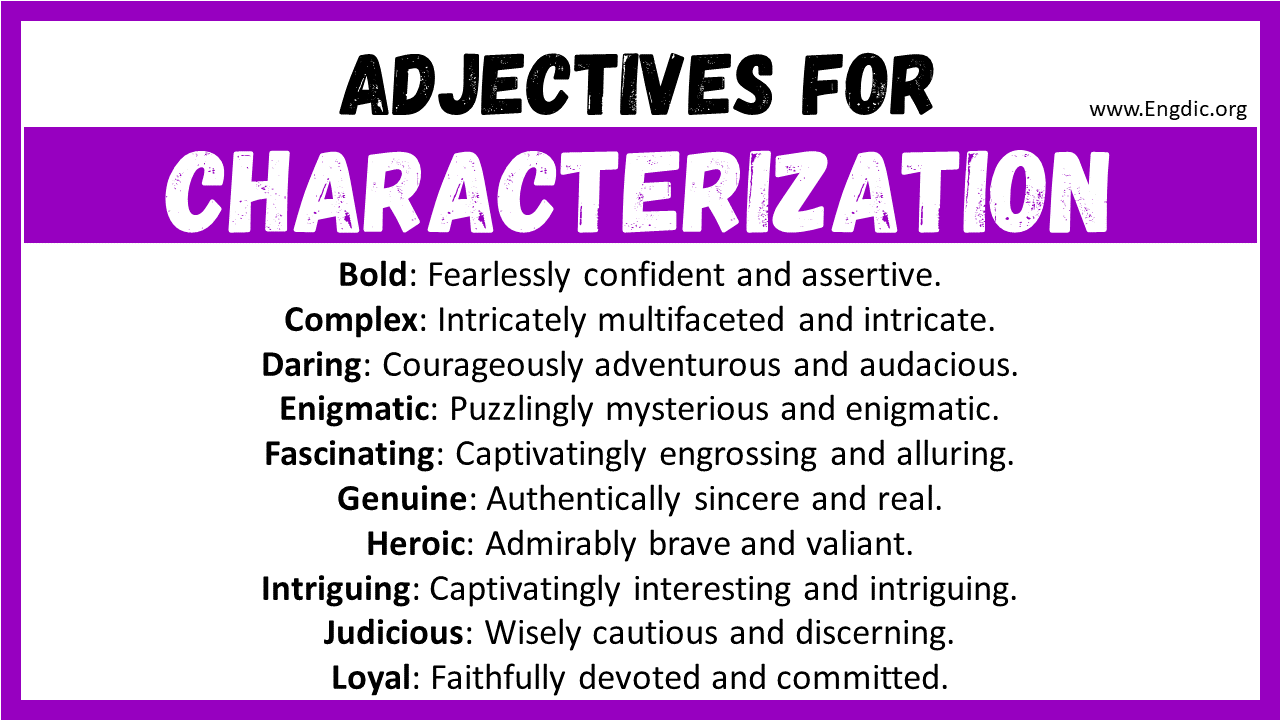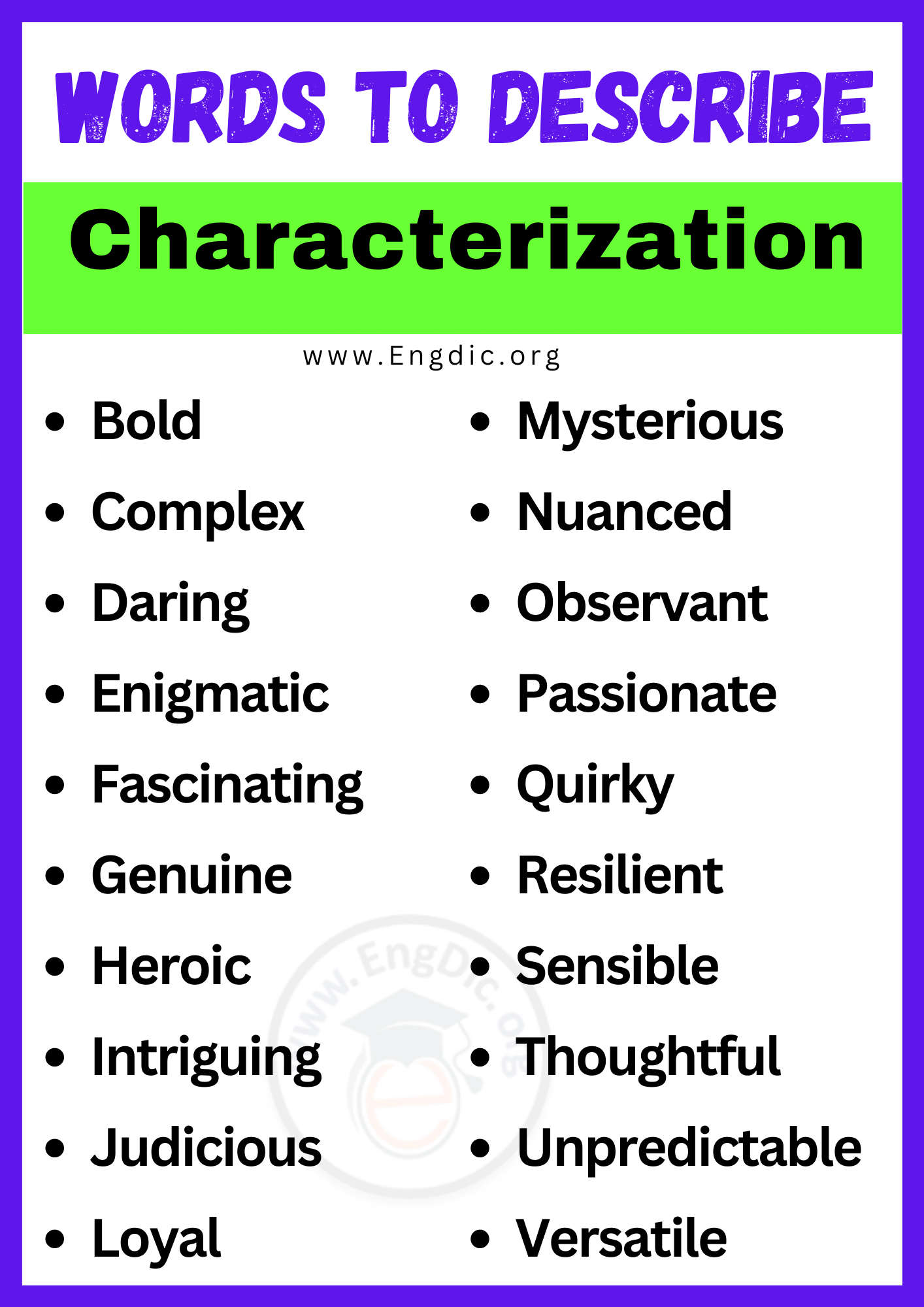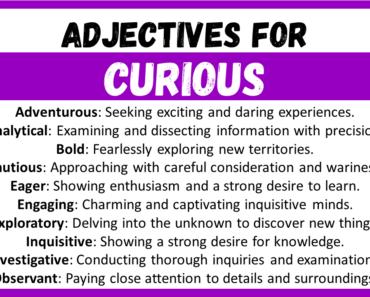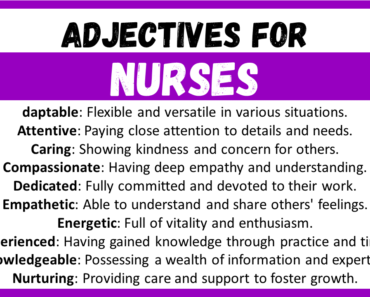Understanding characterization is essential for appreciating the depth and complexity of literary works. In simple terms, characterization refers to the process of creating and developing fictional characters within a story. It involves the use of various words and traits to vividly portray a character’s personality, motivations, emotions, and actions. Words to describe characterization encompass a wide range of adjectives and phrases that paint a comprehensive picture of these fictional beings, making them relatable, and memorable, and ultimately driving the narrative forward with their unique qualities.
Adjectives for Characterization
Here are the 20 Most Popular adjectives for characterization:
- Bold
- Complex
- Daring
- Enigmatic
- Fascinating
- Genuine
- Heroic
- Intriguing
- Judicious
- Loyal
- Mysterious
- Nuanced
- Observant
- Passionate
- Quirky
- Resilient
- Sensible
- Thoughtful
- Unpredictable
- Versatile
Words to Describe Characterization with Meanings
- Bold: Fearlessly confident and assertive.
- Complex: Intricately multifaceted and intricate.
- Daring: Courageously adventurous and audacious.
- Enigmatic: Puzzlingly mysterious and enigmatic.
- Fascinating: Captivatingly engrossing and alluring.
- Genuine: Authentically sincere and real.
- Heroic: Admirably brave and valiant.
- Intriguing: Captivatingly interesting and intriguing.
- Judicious: Wisely cautious and discerning.
- Loyal: Faithfully devoted and committed.
- Mysterious: Eerily enigmatic and cryptic.
- Nuanced: Subtly distinct and sophisticated.
- Observant: Attentively perceptive and watchful.
- Passionate: Intensely fervent and ardent.
- Quirky: Unconventionally peculiar and eccentric.
- Resilient: Strongly adaptable and tough.
- Sensible: Prudently reasonable and practical.
- Thoughtful: Considerately reflective and contemplative.
- Unpredictable: Unforeseeably uncertain and erratic.
- Versatile: Highly adaptable and flexible.
Example Sentences for Characterization Adjectives
- The bold knight faced the dragon fearlessly.
- Her complex personality intrigued everyone around her.
- The daring acrobat performed breathtaking stunts.
- The detective was intrigued by the enigmatic case.
- The museum displayed a fascinating collection of artifacts.
- His smile showed his genuine happiness and joy.
- The soldier performed a heroic act of bravery.
- The mysterious letter contained an intriguing riddle.
- She made a judicious decision after careful consideration.
- The dog remained loyal to its owner throughout.
- The abandoned house had a mysterious aura.
- The film’s nuanced characters were relatable and real.
- The detective’s observant eye spotted the clue.
- His passionate speech inspired the audience deeply.
- Her quirky habits amused her friends endlessly.
- Despite the challenges, the team showed a resilient spirit.
- His sensible advice helped me make a better choice.
- She shared a thoughtful quote with her followers.
- The weather in this region is highly unpredictable.
- The versatile actor effortlessly portrayed diverse roles.
Explore More Words:
FAQ’s
How to describe characterization in writing?
Characterization in writing involves vividly portraying a character’s personality, emotions, and actions using descriptive words and traits, creating a well-rounded and relatable fictional being.
What are five words that describe character traits?
Bold, compassionate, resilient, witty, and honest are five words used to describe character traits in individuals.
How do you analyze characterization?
To analyze characterization, carefully observe a character’s behavior, dialogue, thoughts, and interactions with others to understand their motivations, development, and impact on the story’s plot and themes.








